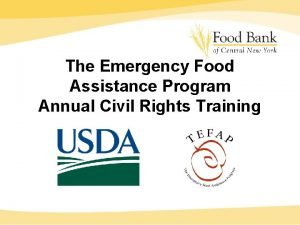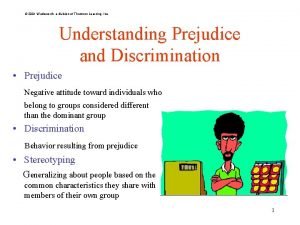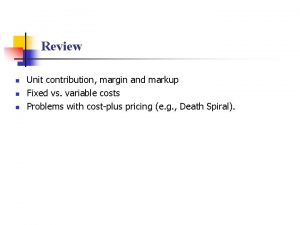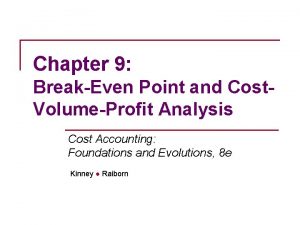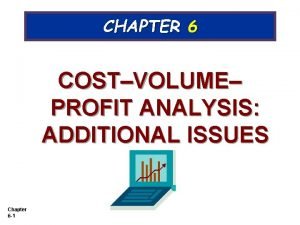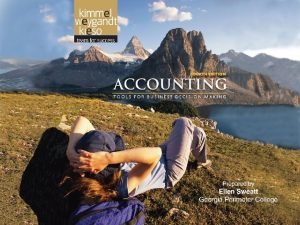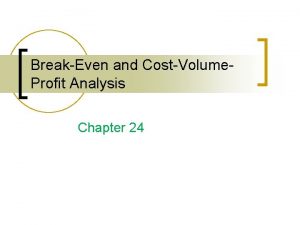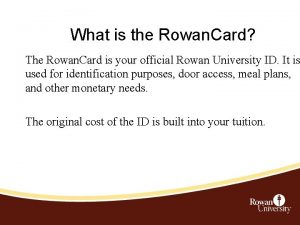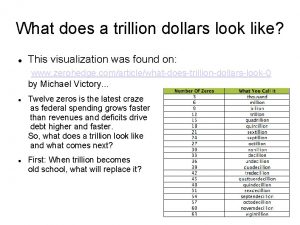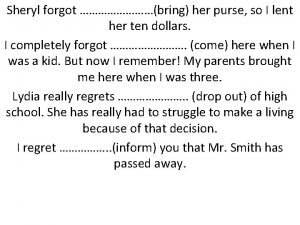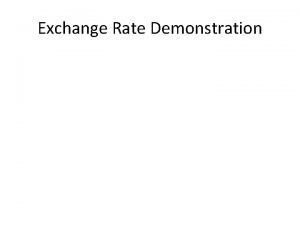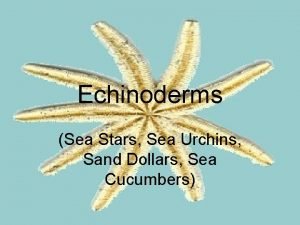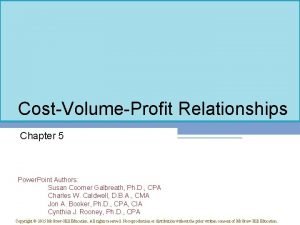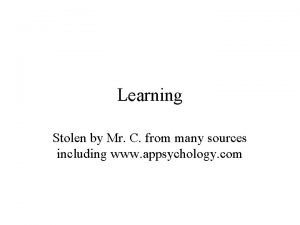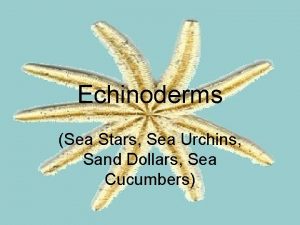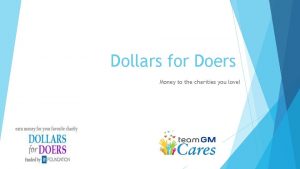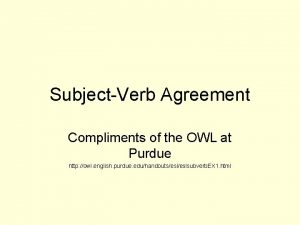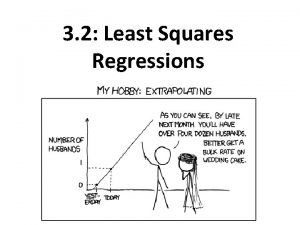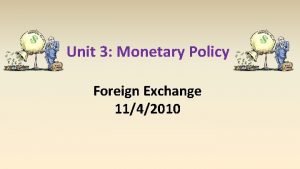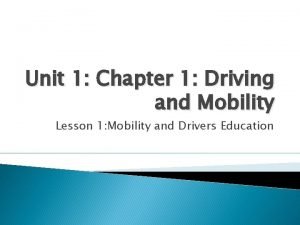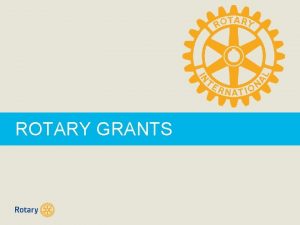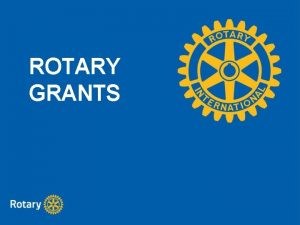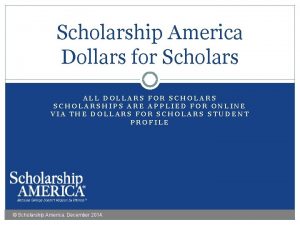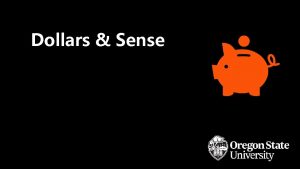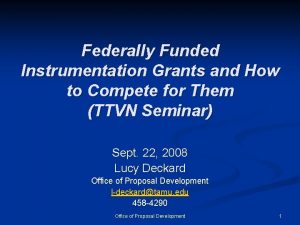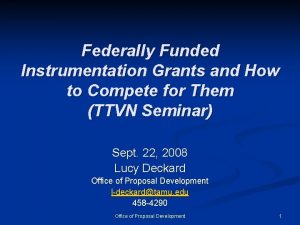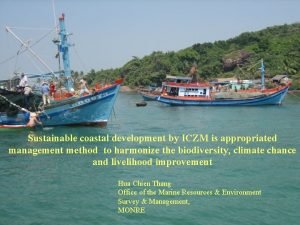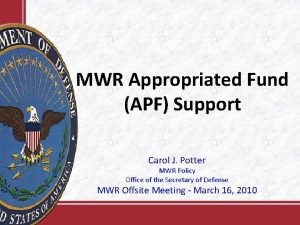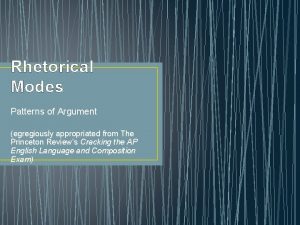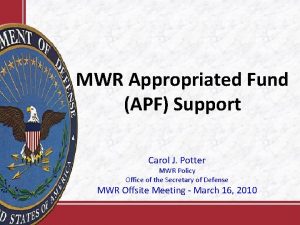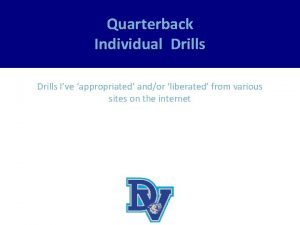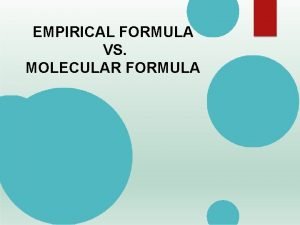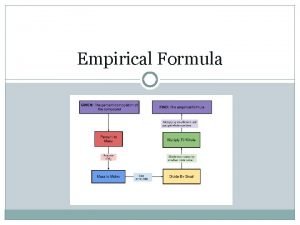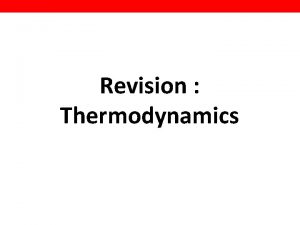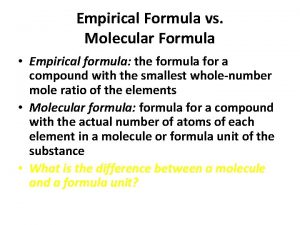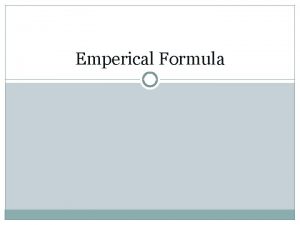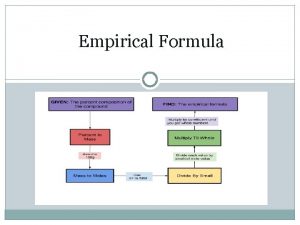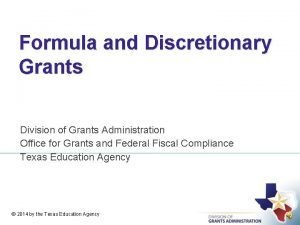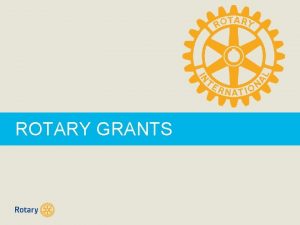Formula Grants Formula grants are Federally appropriated dollars




































- Slides: 36

Formula Grants Formula grants are Federally appropriated dollars which are allocated annually to the 50 States and Insular Areas for the purpose of continuing agricultural research and extension activities.

Formula Fund Programs u Research u Hatch (1862 and 1890 LGIs) Act of 1887 u Mc. Intire-Stennis Act of 1962 u Evans-Allen (Section 1445 of the National Agriculture Research, Extension, and Teaching Policy Act of 1977 - NARETPA) u Animal Health & Disease Research u (Section 1433 – NARETPA, 1977)

Formula Fund Programs u Extension (1862 and 1890 LGIs) u Smith-Lever Act of 1914 u Section 1444 of NARETPA, 1977 u Renewable Resource Extension Act of 1978 (RREA) u Education (1994 LGIs) u Equity in Educational Land-Grant Status Act of 1994 Program

Hatch Act Funds u Recipients: State Agricultural Experiment Stations in 50 States, DC, Guam, Puerto Rico, the Virgin Islands, Micronesia, American Samoa, and Northern Marianas Islands

Hatch Act Funds u Matching: u 100% for 1862 LGIs on Hatch Regular and Multi-state Research funds u Insular 1862 s must match 50% of their FY 2002 allocation, and thereafter. Matching waivers may be requested.

Hatch Act Funds u Carryover: u 100% u Funds may be carried over for one full year. must be expended by the end of the second year.

FINANCIAL ADMINISTRATION

ALLOWABLE COSTS ¡ Factors Considered: l Reasonable l Allocable l Applied Consistently l Limited by regulations-OMB Circular A-21 (Cost Principles for Educational Institutions) and Administrative Manual for the Hatch (Experiment Station) Act as amended.

REASONABLE: ¡ Recognized as necessary ¡ Meets the terms and conditions of the Federal statute and Plan of Work/agreement ¡ Market prices for comparable goods/services ¡ Acted with due prudence in responsibility ¡ Consistent with the institution’s policy

ALLOCABLE: ¡ It was purchased solely to benefit the project or program l If it benefits more than one project, costs must be allocated on any reasonable basis (adopted by the institution) which is applied consistently ¡ Costs may not be shifted from one project to another to cover budget shortfalls or overruns ¡ Costs allocable to industry or foreign governments may not be shifted to Federal awards ¡ Internal Controls-no “one” person has control over all aspects of a transaction

APPLIED CONSISTENTLY ¡ Reasonable method adopted by institution ¡ Documented

LIMITED BY: ¡ Applicable Federal Statute ¡ Agency Administrative Guidance ¡ Cost principles in OMB Circular A-21, A-87, A-110 ¡ Code of Federal Regulations (Title VII)

FINANCIAL MANAGEMENT AND ACCOUNTING OPERATIONS ¡ Accountability shall be based on the total annual Hatch program conducted by each station, rather than on individual projects. ¡ Examinations in the form of audits or internal audits are required to occur not less than every two years. Generally, examinations conducted on a university wide basis to test the fiscal integrity of financial transactions, as well as compliance with the terms and conditions of Federal grants and other agreements will meet the requirements of the Act.

UNALLOWABLE COSTS: Entertainment costs ¡ Fines or penalties ¡ Goods and services for personal use ¡ Housing and personal living expenses ¡ Indirect costs/overhead ¡ Insurance against defects ¡ Legal expenses ¡ Lobbying ¡

UNALLOWABLE COSTS ¡ Advertising and public relations costs l Except: hiring staff, procurement, disposal; etc. Airfare costs (excessive amounts) ¡ Alcoholic beverages ¡ Alumni activities ¡ Bad debts ¡ Commencement costs ¡ Contingency provisions ¡ Donations and contributions ¡

UNALLOWABLE COSTS ¡ Memberships in civic, social, or community organizations ¡ Recruitment costs (excessive) ¡ Salaries related to classroom instruction ¡ Selling and marketing expenses ¡ Student activity costs ¡ Tuition ¡ Volunteer services ¡ Any other costs deemed unallowable by statute, regulation, or policy

DOCUMENTATION STANDARDS ¡ Costs must be reasonable, allocable, and allowable ¡ Internal controls (no “one” person has control over all financial aspects of a transaction) ¡ Reasonable method of allocation ¡ Must meet the requirements of A-110, Grants and Agreements with Institutions of Higher Education, Hospitals, and Other Non-profit Organizations

RECORD RETENTION ¡ All records pertinent to an award must be retained for 3 years from the date of submission of the Final SF-269, Financial Status Report l l Financial records Supporting documents Statistical records All other pertinent records

EXCEPTIONS ¡ Unless litigation, an audit, or other claim is initiated prior to the termination of the 3 year period. (Keep until resolved. ) ¡ Records for real property & equipment must be retained for 3 years after final disposition

MATCHING FUNDS ¡ Contributions may be included when the following are met: l l l l Verifiable in the records Not included as contributions for other Federal awards Necessary and reasonable for the project Allowable under the Cost Principles Non-Federal funds (donations) Are in the approved budget Conform to other provisions of OMB Circulars

Matching requirements The Hatch program is exempt from the indirect cost provision of OMB Circular A-21. Accordingly, indirect costs are not allowable as contributions in satisfying the matching requirements.

TRAVEL ¡ Research Formula funds: Approval delegated to Research Director/A-TR for both domestic and foreign travel.

JOINT/SPLIT APPOINTMENTS ¡ Costs included l l ¡ Activities directly related to the project Writing reports or articles Participating in seminars and meetings Consultations Costs for salaries and fringe benefits are determined by time and effort reporting.

FRINGE BENEFITS ¡ Contributions to LGI retirement systems is limited to 5% of the salaries paid from formula funds ¡ Health Insurance program ¡ Unemployment Compensation ¡ Workman’s Compensation

CAPITAL EXPENDITURES: Equipment purchases of $5, 000 or over, should be capitalized for all formula funds. ¡ New construction or renovations – not allowed with extension funding ¡ ¡ Use the depreciation method normally used by UC for the asset type

PROPERTY DISPOSAL ¡ When replacing a vehicle, one vehicle may be used as a trade-in to offset the cost of a new vehicle purchased with formula funds ¡ When vehicles or equipment ($5, 000 value and more) are no longer needed for the project, LGI may retain provided Federal awarding agency or it’s successor is compensated (7 CFR 3019. 34) ¡ Equipment with a unit acquisition cost of less than $1, 000, may be sold or retained with no further obligation to the Federal government (7 CFR 3015. 168) ¡ Otherwise, contact CSREES for disposition instructions

Program Income ¡ Royalties from copyrights or patents resulting from research conducted with Federal formula funds are not considered program income and represent no obligation to the Federal government ¡ Proceeds from the sale of real or personal property purchased in whole or part with Federal funds (7 CFR 3015. 168) ¡ All other program income shall be retained by the LGIs and used to further program objectives ¡ Program income is not acceptable as matching funds

There are three types of reporting requirements for these funds: l l l Plan of work CRIS Financial Reporting

Plan-of-Work Reporting ¡ 1) Considers the entire portfolio of agricultural research and extension formula funds awarded to each 1862 and 1890 land-grant institution. ¡ Each 1862 and 1890 land-grant institution is required to submit every five years a plan of work for their agricultural research and extension formula funds authorized under the Hatch Act, Smith-Lever Act, and sections 1444 and 1445 of the National Agricultural Research, Extension, and Teaching Policy Act. ¡ Every year LGI’s are required to submit an Annual Report of Accomplishments and Expenditures.

Current Research Information System (CRIS) Reporting is done on a project basis. Hatch research projects are submitted for approval to CSREES by the state agricultural experiment stations (SAES). Each year SAESs submit to the CRIS office a progress report and an expenditure report for all the Hatch projects they supported in the previous year.

Financial Reports ¡ Certification of Offset (Form CSREES-2103) which is completed by the SAES's to certify that matching funds have been made available; ¡ b) SF-272, Federal Cash Transaction Report, which is submitted on a quarterly basis through the U. S. Department Health and Human Services' Payment Management System (DHHS-PMS); and ¡ c) SF-269, Financial Status Report, which is submitted on an annual basis to the Funds Management Branch by December 31 st, for the reporting period of October 1 st through September 30 th.

AREERA Requirements ¡ The Agricultural Research, Extension, and Education Reform Act of 1998 (AREERA) amended the Smith-Lever Act, the Hatch Act, and the National Agricultural Research, Extension, and Teaching Policy Act of 1977 (the funding authorities for Extension and Research activities) to require approved Plans of Work from Extension and Research in order to receive federal funding. ¡ The AREERA Plans of Work pertain only to the Smith-Lever 3(b)&(c), Hatch, Evans-Allen, and 1890 Extension funds. Other funding authorities such as the Smith-Lever 3(d), NRI, and other grants and project funds will continue to require plans or proposals for their continued distribution of funds.

Hatch Act Funds u Use must meet AREERA requirements: Section 204 of AREERA added Section I to the Hatch Act, which states that states must expend for integrated research and extension activities in FY 2000 and thereafter a percentage that is equal to the lesser of 25 percent or twice the percentage of funds expended by the institution for integrated research and extension activities in FY 1997. (This section also require that the institutions include in the plan of work a description of the manner in which they will meet these multi-state and integrated requirements. )

UC Next Steps …. ¡ To meet the increased accountability requirements on the use of Hatch Funds, new accounts and funds will be used to record Hatch expenditures. ¡ Beginning October 1, 2006 expenditures will be charged directly to the new accounts and funds.

UC Next Steps …. Separate OP fund numbers have been set-up to track expenditures for: Regular Hatch ¡ Multi-state Hatch ¡ Integrated Hatch ¡ Multi-state / Integrated Hatch ¡

Contact Information: Jo Ann Javier Director, Financial Services UCOP – ANR Tel: 510 -287 -3350 E-mail: joann. javier@ucop. edu
 Insidan region jh
Insidan region jh Federally protected classes
Federally protected classes Federally protected classes
Federally protected classes Civil rights training quiz answers
Civil rights training quiz answers Federally protected classes
Federally protected classes Break-even point formula in units
Break-even point formula in units Breakeven in units formula
Breakeven in units formula How to calculate unit contribution margin
How to calculate unit contribution margin Margin of safety sales formula
Margin of safety sales formula Break even analysis
Break even analysis Margin of safety formula
Margin of safety formula Rowancard login
Rowancard login How much does 1 million look like
How much does 1 million look like Sheryl forgot her purse so i lent her ten dollars
Sheryl forgot her purse so i lent her ten dollars Missing dollar paradox answer
Missing dollar paradox answer 1 million dollars vs 1 billion
1 million dollars vs 1 billion Poundd to dollars
Poundd to dollars The old lamp is five dollars. it’s made in china
The old lamp is five dollars. it’s made in china Sand dollar anatomy
Sand dollar anatomy How to calculate break even point in dollars
How to calculate break even point in dollars As manager of the st cloud theatre company
As manager of the st cloud theatre company Who wants to win a million dollars
Who wants to win a million dollars Garcia effect
Garcia effect Sand dollar anatomy
Sand dollar anatomy Dollars for doers
Dollars for doers George and tamara (doesn't don't) want to see that movie
George and tamara (doesn't don't) want to see that movie The scatterplot shows the payroll (in millions of dollars)
The scatterplot shows the payroll (in millions of dollars) Document
Document 5 million dollars
5 million dollars Coop advertising for local manufacturing businesses
Coop advertising for local manufacturing businesses Who wants to win a million dollars
Who wants to win a million dollars Ppp meaning
Ppp meaning Substituting dollars for bullets
Substituting dollars for bullets Healthy vs unhealthy weight loss
Healthy vs unhealthy weight loss 600 trillion dollars
600 trillion dollars Crash costs are measured in dollars and in
Crash costs are measured in dollars and in Nmsu housing work order
Nmsu housing work order

